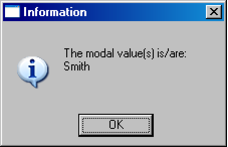MODAL Function
The MODAL function provides a measure of central tendency that identifies the element or elements of a data set that repeats most frequently, and more frequently than another element of the data set. Unlike AVERAGE and MEDIAN, the MODAL function can be applied to non-numeric data. The following table shows how MODAL works on various data sets:
This function has the following syntax:
Array = modal(list = array [, modecount = byref(integer)]
[, ignorecase = integer]);
This function returns:
• Array of Object—Array containing the modal element or elements of the list. The array must be of the same type as the array passed to MODAL.
• Null—If list is NULL or empty
Example—MODAL function:
/*
** Identify the most frequently occurring surname in an HR database
*/
initialize()=
declare
array_name = array of stringobject;
array_results = array of stringobject;
dbso = DBSessionObject;
msg = varchar(256) not null;
n = integer not null;
ret = integer not null;
enddeclare
{
/*
** Connect to the database
*/
ret = dbso.Connect(database = 'xxxxxxxx::testdb');
CurFrame.DBSession = dbso;
/*
** Load the surnames in the roster into an array
*/
n = 1;
select lastname as array_name[n].Value
from hr_table
{
n = n + 1;
};
/*
** Pass the array of surnames to the Modal function
*/
array_results = modal(list = array_name);
/*
** Loop through the results to report all modal values
*/
if array_results.AllRows = 0 then
msg = 'No modal value';
else
msg = 'The modal value(s) is/are: ';
for n = 1 to array_results.LastRow do
msg = msg + HC_NEWLINE;
msg = msg + array_results[n].Value;
endfor;
endif;
/*
** Report the results
*/
message msg;
/*
** Disconnect from the database
*/
dbso.Disconnect();
}
Sample output is shown in the following illustration:

